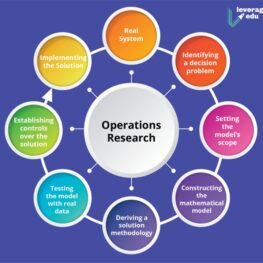Categories
Mathematics & StatisticsDescription of the Programme
Operations Research is a branch of science that makes use of advanced analytical techniques in the fields of statistics, mathematical modeling and optimization to help students arrive at optimal solutions to difficult and complex decision-making problems. The curriculum is well suited for students with an aptitude for mathematics applications. You will be able to formulate mathematical, experimental and simulation models. Students will also be able to define and evaluate operational problems and alternatively recommend computational as well as manipulative methods that will help solve these complex problems. At the undergraduate level, the programme offers basic courses in statistics, probability, simulation, applied mathematics, calculus, linear algebra, ordinary differential equations and optimization in addition to more professionally-oriented operations research courses. At the end of the 8th semester, each student shall be required to undertake a practical attachment for a period of not less than 8 weeks.
Why Operations Research?
Operations Research provides the best use of available resources. In today’s modern business world, customers expect high-quality services and products where and when they need them. In the same vein, both public and private organizations need to provide these services and products as efficiently and effectively as possible. This requires careful planning and analysis – the hallmarks of good Operations Research. This is generally based on process modelling, business analytics or analysis of options.
Examples of Operations Research Applications
- Scheduling of vehicles in supply chains/supply chain management and coordination
- Scheduling of orders in a factory
- Developing customer profiles, evaluating the value of sale promotions and computing the lifetime value of a customer
- Finding the best ways to deploy troops rapidly for defence and peacekeeping
- Computer simulations of airports for the safe and rapid processing of travelers and scheduling flights/fleet for airlines
- Improving the systems for an appointment for medical practice
- Planning and forecasting: deciding how much capacity is needed in holiday business.
- Credit scoring: deciding which customers offer the best prospects for credit companies.
- Yield management: setting the prices for hotel rooms and airline seats to reflect changing demand.
- Revenue maximization using product bundling
- Business analytics for non-profit marketing and online advertising
- The analytic network process applied in supply chain decisions
- Modeling patient flow in a network of intensive care units (ICUS) and scheduling of operations in theatres in a hospital
- Managing outsourcing decisions: government policy, firm options, and the economic impact
- Applications of revenue management in healthcare
- Environmental management and monitoring
- Humanitarian logistics and relief operations
- New product development
- Digital operations
Minimum Entry Requirements
This content is restricted to site members. If you are an existing user, please log in. New users may register below.






